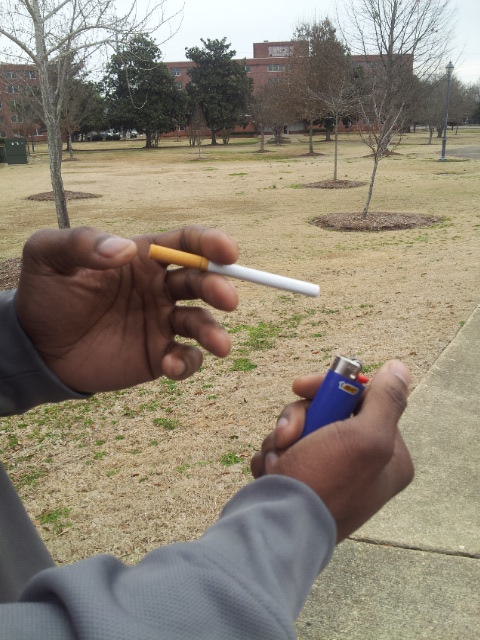Daysha Humphrey
Campus Editor
At this spring’s faculty convocation, Dr. Jim Borsig had an announcement that he saved for last, and the repercussions from it are still rippling through campus.
He announced that he wanted the MUW campus to be tobacco free by July 1, 2016.
While it may not have come as a total surprise, given that other universities have been making this type of change, it was the first official word that the university is moving in this direction.
Faculty, staff and students who smoke already have some limitations on campus. The MUW Student Handbook 2014-2015 states in section 7.11 that “smoking is prohibited in all campus buildings. Smoking is allowed only in designated areas, which must be at least 20 feet from all building entranceways. Discarded cigarettes should be placed in appropriate containers.”
Some people who have heard discussions about the upcoming change in the tobacco policy on campus have strong opinions about this strategy — especially students.
Phebe Davis, a freshman psychology and music double major, said that she is not a smoker, but the rule is not fair.
“It is trampling my fellow students’ rights, and if that’s allowed now, could later affect me,” Davis said. “I understand that smoking is unhealthy, however, a student should have the freedom to smoke a legal substance if they choose to. Prohibiting what someone does outside in their own free time does not seem legal or constitutional to me.”
Davis also says that this is not a good idea for the campus, because it does not stress students’ rights.
“I don’t think that it’s a good idea to restrict students’ liberties for their own good. I live in America; therefore I have the freedom to do what I want to as long as I’m not harming another or breaking a law,” Davis stated.
Davis wants all of the students to have their rights as a smoker. However, Jessica Barnett, a junior communication major, is a smoker and says that she is OK about the rule extending to campus.
“I don’t mind it,” Barnett said. “Anti-smoking policies are so commonplace that I was actually surprised to learn the W doesn’t already have one.”
Barnett, unlike Davis, thinks that it is a good idea for MUW.
“I may be an addict, but I’m not oblivious to the health risks,” Barnett said. “People are becoming more focused on bettering the health of themselves and others, and this is an easy way to do it.”
The students are not the only ones who are concerned and are attentive on this regulation. Claudia McDavis, a retention specialist, teaches “Substance Abuse Public Health” and thinks that this will be a good idea for the campus.
“Having a smoke-free campus will not only help individuals, but the environment as well,” McDavis said. “There will be those that will continue to try to push or bend the rules, but statistics have shown that being in a smoke-free environment produces better and more productive workers.”
However, Davis thinks otherwise.
“I don’t think it will create a healthier campus because not many students smoke while walking around, and the majority stay in designated areas,” said Davis. “The buildings are already smoke-free areas, so the only thing this rule does is ostracize the smoking students from campus.”
Borsig said the tobacco-free campus policy is a result of recent research on the MUW campus.
“The goal is to promote health of all students, faculty and staff,” Dr. Borsig said. “A 2014 research study found an overwhelming majority of students, faculty and staff concerned by their exposure to secondhand smoke outside while on campus.”
Furthermore, he gives information on the percentages of votes on this policy coming to MUW.
“72 percent of students and 77 percent of faculty and staff agreed or strongly agreed the university should lessen the risk of tobacco addiction by adopting policies that discourage tobacco use,” Borsig said. “We will rely on a combination of education and personal accountability. I anticipate the task force will have further recommendations regarding the policy revision, as well as effective education and cessation programs.”
The implementation date is scheduled for July 1, 2016, when all of the details will be discussed.
“The president will appoint a broad-based committee to include students, faculty and staff to help work through the specific issues of how this will roll out,” said Nora Miller, senior vice president for administration and the chief financial officer of the university.
“We have already discussed the need for educational programming and tobacco cessation programs for students, faculty and staff. At least two other institutions in the IHL system are already tobacco free. Delta State University, University of Mississippi and the University of Alabama became non-smoking January 1. We can learn best practices from these and the other institutions that have already made the change to tobacco-free.”
Some students, faculty and staff may not consider the change that is about to happen on campus. Others may support the rule, just like they support Alcohol Awareness Week here at MUW.
“As the former alcohol prevention specialist, I saw what the results of bringing awareness to alcohol responsible habits did to our MUW community,” said McDavis. “If we had a Smoke-Free Awareness Week, it would draw attention to the dangers of smoking for the individual and others that they are around.”
Borsig said he is prepared for this change at MUW.
“I believe it encourages all of us to examine behaviors that can cause long-term health risks and to be respectful of the university community.”